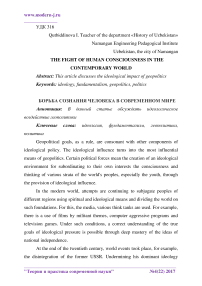The fight of human consciousness in the contemporary world
Автор: Qutbiddinova I.
Журнал: Теория и практика современной науки @modern-j
Рубрика: Основной раздел
Статья в выпуске: 4 (22), 2017 года.
Бесплатный доступ
This article discusses the ideological impact of geopolitics
Ideology, fundamentalism, geopolitics, politics
Короткий адрес: https://sciup.org/140289375
IDR: 140289375
Текст научной статьи The fight of human consciousness in the contemporary world
Geopolitical goals, as a rule, are consonant with other components of ideological policy. The ideological influence turns into the most influential means of geopolitics. Certain political forces mean the creation of an ideological environment for subordinating to their own interests the consciousness and thinking of various strata of the world's peoples, especially the youth, through the provision of ideological influence.
In the modern world, attempts are continuing to subjugate peoples of different regions using spiritual and ideological means and dividing the world on such foundations. For this, the media, various think tanks are used. For example, there is a use of films by militant themes, computer aggressive programs and television games. Under such conditions, a correct understanding of the true goals of ideological pressure is possible through deep mastery of the ideas of national independence.
At the end of the twentieth century, world events took place, for example, the disintegration of the former USSR. Undermining his dominant ideology changed the world map. Under the rule of the former Soviet, the communist idea forcibly «united» representatives of more than one hundred nations and nationalities. This was inherent in Central Asia. In connection with the gaining of state independence by the former union republics of the region, the former ideology was undermined from within.
The former center, which intended to restore its domination in the early 1990s, continued the policy of opposing the countries of Central Asia to the rise of interethnic contradictions. In fact, these attempts represented an ideological diversion aimed at harming the centuries-old friendship that exists between the countries and peoples of the region.It was replaced not immediately by a truly national (popular) ideology in every country in Central Asia. Under such conditions, the ideas of religious fundamentalism, terrorism, and extremism began to penetrate the region.
In fact, the goal of the bearers of the ideas of fundamentalism and extremism, pursued from penetrating into Central Asia, was not to restore religious values. Their goal is to create, through the use of these ideas, an environment of instability, interregional and interethnic strife, and ultimately -the seizure of power. These attempts can lead to irreparable tragedies. They want to drive the world, including our country, into the abyss of bloodshed and fratricide, as is the case in Afghanistan, in Chechnya, in Kashmir, in the Middle East.At present, the possibility of bringing terrorist acts in the region from enemies of Uzbekistan's independence, from religious extremists, is not ruled out.
Deeply aware of this danger, warning us all about possible terrible consequences, our President in his work «Uzbekistan on the threshold of the 21st century: the threat to security, the conditions of stability and development guarantees» notes:
«Numerous politicians, scientists, journalists tried to give their understanding of the causes of the phenomenon of the late twentieth century, which received a variety of names «Islamic renaissance», «Phenomenon of Islam». Without going into the discussion of concepts, I would like to focus attention on the fact that the phenomena occurring under the flag of the revival of Islamic values are very diverse, sometimes contradictory and even disparate.
This thought of our President was justified. On February 16, 1999, extremist terrorists carried out subversive activities in Tashkent in order to achieve their black intentions. It was clear that behind their back there were large hostile forces. Their aim was to undermine the peaceful life of our people, to intimidate him, to bring hysterics to his heart, to weaken the confidence in the policy pursued, to nullify the noble intentions being realized.
The main reason for the commission of terrorist acts in Uzbekistan is that the success of our country has been recognized by the world community, political and political stability and interethnic accord have been established in the Republic, priority has been given to universal human values. It is this course of events that causes the enemies of our development to panic. Our enemies hate it; Try to prevent us from enjoying our success. In fact, during the years of independence, the true values of Islam were restored in our country; They have become an inseparable part of the spirituality of our people.
All the countries of Central Asia support Uzbekistan's policy aimed at strengthening friendship between nations. The spiritual roots of the peoples of the region are close. Further strengthening of the unity of all peoples has a positive impact on the spiritual flowering of the entire region.
As is known, in September 2000 the «Millennium Summit» of the UN General Assembly took place. Speaking on it, I.Karimov drew the attention of the world community to the issues of combating international terrorism and drug trafficking related to ensuring stability and security in Central Asia; On the problems of improving the global security system. The leaders of the countries of Central Asia, correctly aware of the extremely important importance of these processes, discuss security issues and other pressing issues on a regular basis bilaterally and within the framework of the CACO (Central Asian Cooperation Organization). Joint decisions are being developed and are making important contributions to ensuring security in the region.
Used sources:
Список литературы The fight of human consciousness in the contemporary world
- Islam Karimov. Uzbekistan: national independence, economy, politics, ideology. Tashkent: Uzbekistan, 1996. T. 1.
- Islam Karimov. Ideology is the uniting flag of a nation, society, state. Answers to the questions of the editor-in-chief of the journal "Tafakkur". Tashkent: Uzbekistan, 1999.


